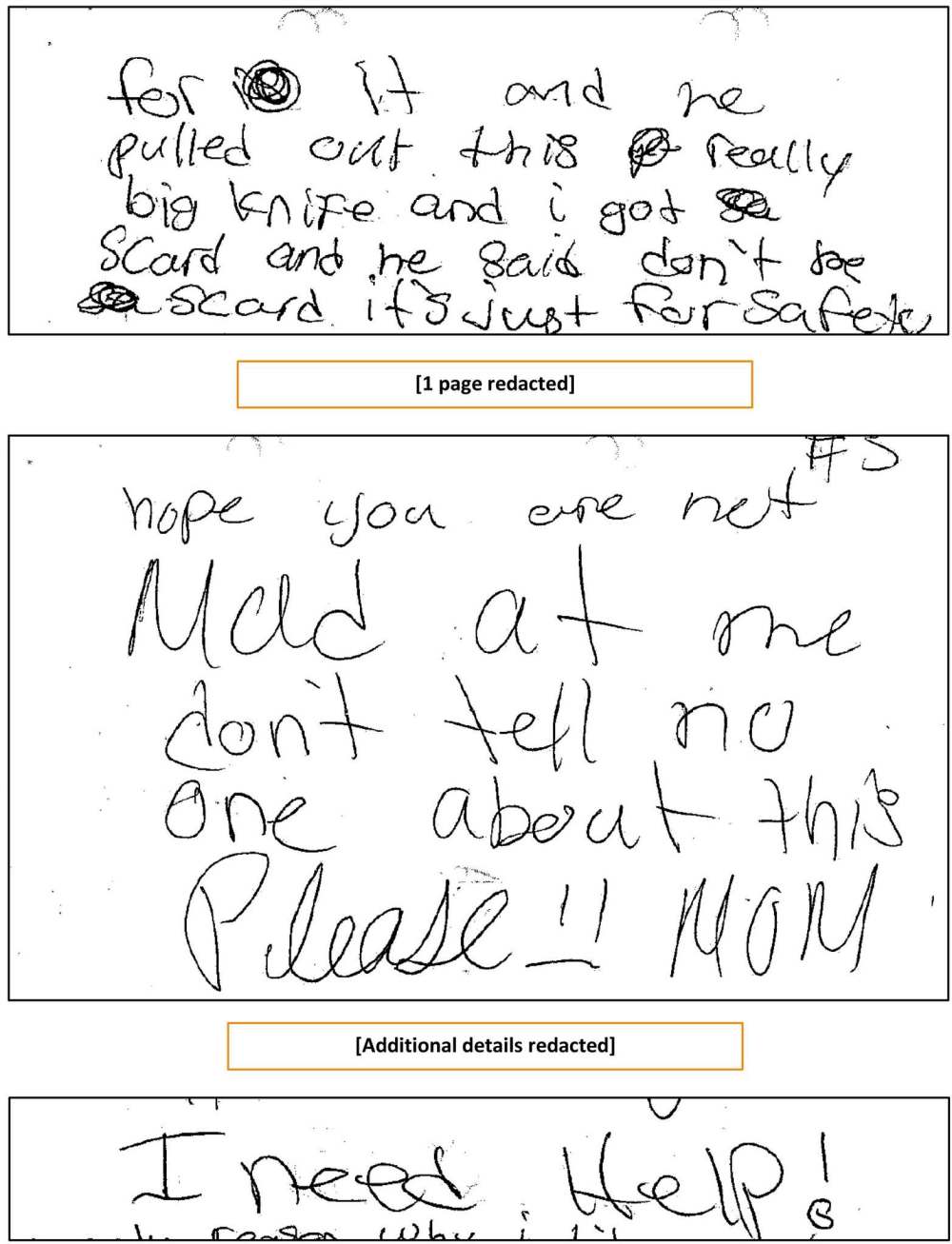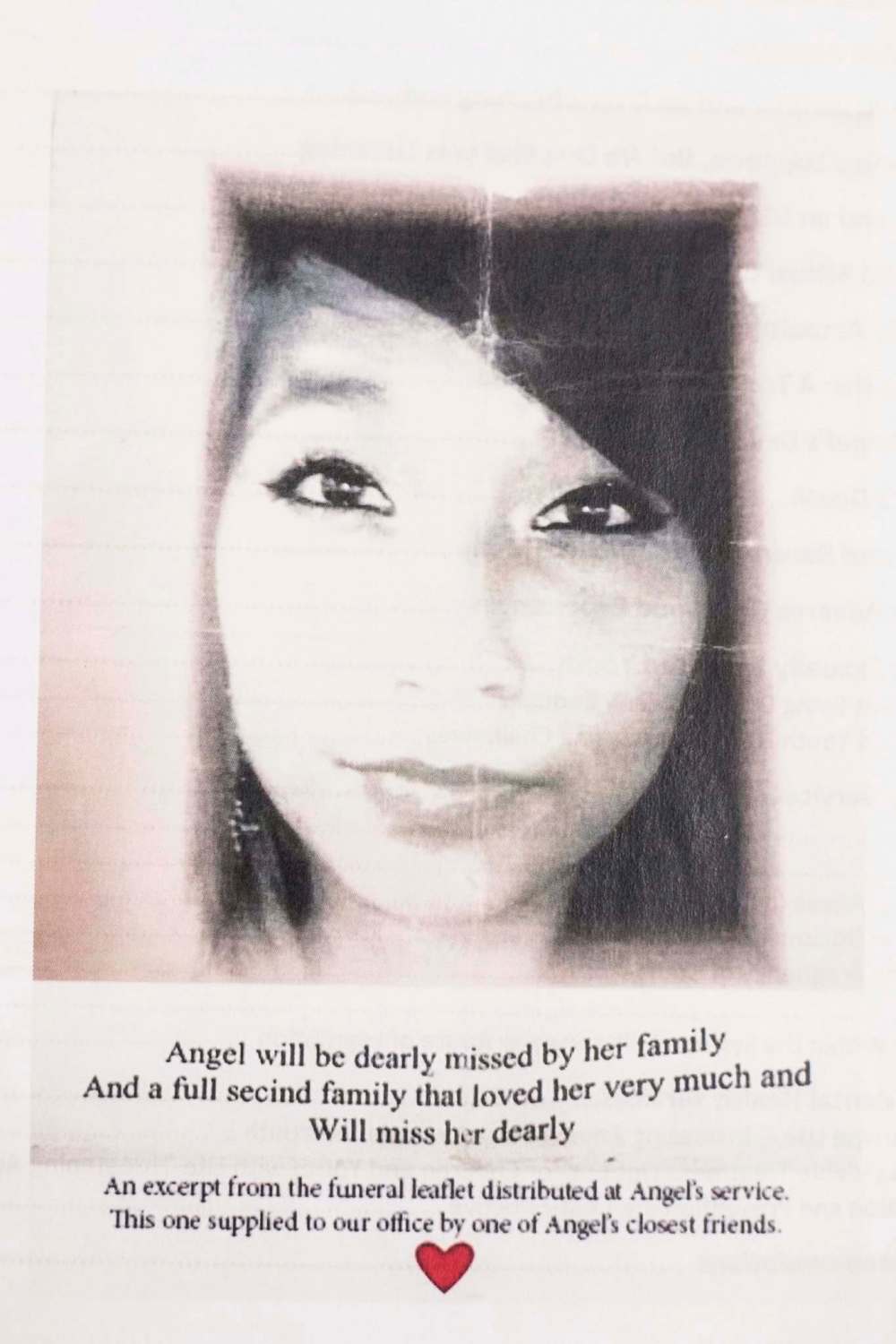Angel’s story a troubling look at a troubled Child and Family Services
Read this article for free:
or
Already have an account? Log in here »
To continue reading, please subscribe:
Monthly Digital Subscription
$19 $0 for the first 4 weeks*
- Enjoy unlimited reading on winnipegfreepress.com
- Read the E-Edition, our digital replica newspaper
- Access News Break, our award-winning app
- Play interactive puzzles
*No charge for 4 weeks then billed as $19 every four weeks (new subscribers and qualified returning subscribers only). Cancel anytime.
Read unlimited articles for free today:
or
Already have an account? Log in here »
Hey there, time traveller!
This article was published 12/12/2018 (1960 days ago), so information in it may no longer be current.
By the time Angel was six years old, she’d received 25 different foster placements. By her 12th birthday, she had been apprehended by Child and Family Services 14 times and was often allowed to return to her troubled home with few checks on the fitness of her family to care for her.
Instances of sexual abuse date back to when she was a toddler, and there is evidence she was sexually exploited as early as age 11. Drug and solvent abuse began by age nine.
Angel, who died in 2015 from an accidental drug overdose at 17, is the face of a troubling report into myriad issues facing youth in the Child and Family Services system.
“Her story is a shocking reminder that too many children and youth are subject to intense trauma and gone too soon,” Manitoba’s Advocate for Children and Youth (MACY) Daphne Penrose told media Thursday when releasing In Need of Protection: Angel’s Story. Angel’s family gave permission to use her name and photo.
Angel’s account, laid out in 118 pages, includes instances of sexual abuse dating back to when she was 21 months old, sexual exploitation from as early as age 11, suicide attempts, solvent and drug use to “numb” her pain and 46 apprehensions into CFS care.
Angel was frequently allowed to return home and live with her mother, though the advocate’s team found CFS officials did not do proper checks to see if her mother could provide a safe home. The girl was re-apprehended numerous times and taken back to CFS placements when something went wrong at home.

At eight years old, Angel asked officials for help as she tried to juggle obligations at home when her mother was absent, but it seems her request wasn’t heard. Various service providers recommended she receive sustained mental health therapy and supports during her youth, but aside from sporadic appointments, it appears Angel never received such care.

“Through her entire life, systems should have been providing protection and services, and they did not,” Penrose said, calling for more “rigorous accountability.”
During the final years of her life, Angel was hit by a vehicle while walking on the highway and was seriously injured. She was frequently reported missing at age 16 and was found to be heavily using drugs and alcohol.
Penrose said her team’s investigation was partially blocked by federal health officials, who would not release health information about Angel from her home community.
Because the advocate works under provincial legislation, she said federal officials aren’t mandated to hand over their files. Penrose is hoping to produce a memorandum of understanding with the federal government to avoid that pitfall in future investigations.
“At the end of the day, the intent of these reports is to look at the services we provided (to children) and look at room for improvement in those services. So my hope is that in the future, we’ll be able to have access to those (files) so that we can determine whether or not improvements to their (federal) services are also required,” she said.
Penrose made six recommendations to government about how to improve outcomes for youths such as Angel. They include developing a trauma prevention and response plan of action through the education, justice and health departments and carrying out public education campaigns denouncing sexual exploitation of children.

The report also includes the stories of seven other young girls who are still struggling to access mental health supports.
“I list just seven girls… where right now their very lives are dependent on getting access to mental health services and treatment because they are so profoundly exploited. This is a right now problem. And as we speak, one of these girls that’s listed here in these seven has been missing here for two months,” Penrose said.
This year, the advocate has repeatedly called on government to produce a youth mental health and addictions strategy and more treatment options for minors. Last Friday’s announcement of $8.4 million from the federal and provincial governments dedicated to more treatment options for people with methamphetamine addictions did not earmark any money for youth, Penrose said.
“I hope with the release of this report and the addition of (stories about) just a few kids that we’re involved with here at MACY – including them in the report might demonstrate how important it is to act now, because these children’s lives depend on it,” she said.
In an emailed statement, Families Minister Heather Stefanson thanked Penrose for her report.
“One of the reasons we expanded the advocate’s mandate is to increase transparency, including the ability to report publicly. We appreciate the comprehensive report compiled by the advocate’s team. (Penrose’s) recommendations require a whole of government response and senior officials from multiple departments will develop responses and discuss options to collaborate on a sexual exploitation public awareness campaign,” Stefanson said, noting they plan to meet with the advocate for more discussion.

Stefanson added that the province is working to implement the recommendations in the Virgo report on addictions and mental health, received earlier this year, to address the rising use and distribution of methamphetamine. The government is slated to release research into sexual exploitation and undertake a third-party review of the StreetReach program, the minister said.
Assembly of Manitoba Chiefs Grand Chief Arlen Dumas has been pushing for Indigenous child care systems to replace Manitoba’s Child and Family Services framework. He believes Angel would not have died had she been taken care of by her community.
“Absolutely it wouldn’t have happened. The reality is that a lot of these resources that are actually needed to properly raise people are not being afforded to these children. They’re being taken out of their communities; they’ve been commodified so that the apprehension of children is more lucrative than actually giving people the resources to keep families together,” Dumas said.
“Had this young woman been under the proper care of the nations who are responsible for her, she’d still be alive today.”
jessica.botelho@freepress.mb.ca Twitter: @_jessbu
Quotes from the report
“Angel was born in early summer of 1998. She was the third child born to Angel’s mother, and would eventually have seven younger siblings; Angel’s father had little contact with the family.”
“Over the 17 years before her death, Angel was moved through 46 different placements by CFS, in addition to the times she was returned home and then re-apprehended.”
“A pattern emerged whereby Angel’s mother would experience a relapse from sobriety, resulting in her children being apprehended due to protection concerns, and then the children would subsequently be returned by the CFS agency to her care. Angel’s mother would willingly undergo and complete treatment for her substance misuse with the goals to remain sober, and to live with and raise her children in a stable home. However, Angel’s mother’s treatment attempts for her alcohol misuse did not work for her.”
“…There was no acknowledgement by the service providers active in the family’s life that the ongoing and severe substance use created significant safety risks for Angel and her siblings. The CFS agency did not undertake any case planning that aimed at sustained improvements for the family’s situation, and the CFS agency did not seek family or community members to provide safe care for the children while they knew Angel’s mother continued to struggle.”
“The CFS agency repeatedly initiated reunification without conducting any of the required assessments, without providing any meaningful interventions or support, and without assessing Angel’s mother’s parental capacity, which they knew to be of significant concern. The CFS agency did not acknowledge or recognize warning signs when Angel presented with signs of sexual abuse, sexual exploitation, and solvent use, when she shared her fears about home visits.”
“Angel was likely sexually exploited by numerous men since she was 11 years old, but quite possibly from 7 years old. The indicators that Angel presented with should have sent red flags up to the service providers, police, and educators that this child was interacting with. Unfortunately, none of them were able to identify the issue of sexual exploitation, and she continued to be sexually abused for years. Many children who are being abused in this manner turn to drugs and alcohol to cope with the constant trauma and horrific sexual abuse.”
“As one would predict, when Angel entered her teen years, she struggled with school attendance, suicidal thoughts, suicide attempts, drug misuse, mental health concerns, and she was sexually exploited,frequently missing, and had come to the attention of the youth justice system.”
“Throughout Angel’s life, the CFS interventions and services she and her family received were inconsistently offered, crisis-driven, if at all,and did not respond in a holistic way to the needs of her family.”
“The need for mental health treatment was consistently identified throughout Angel’s life; it was identified as early as age seven and was recommended by various service providers at least 24 times over 10 years in the files our office reviewed. It is frustrating, then, to learn that there was little or no follow through on these critical recommendations by service providers.”
“The service providers involved in Angel’s life did not properly identify her experiences of trauma and they did not view these as having a compounding effect on her ability to thrive. When she was young, these adverse experiences were sometimes documented but largely ignored. Then, when her trauma began to manifest in predictable behaviours such as aggression, addiction, and self-harm, the language service providers used in file recordings increasingly blamed Angel as she lived out the effects of her unresolved trauma.”
History
Updated on Thursday, December 13, 2018 4:38 PM CST: Adds more comment.











